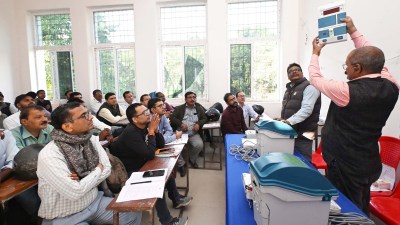Stay updated with the latest - Click here to follow us on Instagram
NHRC directs Gujarat,MP to pay compensation to silicosis victims
The National Human Rights Commission has directed the Gujarat and Madhya Pradesh governments to start the procedure of paying compensation to silicosis victims following a Supreme Court order.
The National Human Rights Commission (NHRC) has directed the Gujarat and Madhya Pradesh governments to start the procedure of paying compensation to silicosis victims following a Supreme Court order.
A survey by the Madhya Pradesh government for NHRC on October 8,2009,had revealed that 259 people had died of silicosis,while another 304 were in a critical state in Jhabua and Alirajpur districts of the state. People from these regions come to Godhra to work as migrant labourers in quarries.
On December 18,a meeting was called by NHRC in New Delhi in which district magistrates of Alirajpur and Jhabua in MP and Panchmahals in Gujarat were apprised about the conditions of silicosis workers.
NHRC Presenting Officer and Sessions Judge Chandrakant Tyagi,who had called the officials from both state governments for the meeting,said: After our teams visited both states,we found that tribals from Alirajpur and Jhabua go to Godhra and the neighbouring areas to work in stone quarries. These people were initially diagnosed with tuberculosis,which later turned out to be silicosis as many of them had deposits of fine sand particles in their lungs.
Meanwhile,three more cases of silicosis were identified in Panchmahals district last month,which were referred to the Sir Sayajirao General (SSG) Hospital in Vadodara.
We examined about 92 people in the last three months,of which three were found to be afflicted by silicosis, said Panchmahals District Collector Milind Torwane. He added that factory owners often do not keep records,which acts as bottlenecks for paying compensation.
In the last four years,12 unlicensed mining units were raided by the Gujarat Pollution Control Board (GPCB) and factory inspectors. Now,there are 18 registered quarries and factories, Torwane added.
Panchmahals Chief District Health Officer (CDHO) Dr Prakash Vaghela added that most of the cases detected in the district had contracted the disease in 1997-1998 when the units were not following the safety norms.
In recent years,very few cases have been detected. So far,we have detected three cases. We have asked the industries to make sure that they are sent to their homes in Alirajpur. But more cooperation from the MP government is needed to establish the identities of the affected people. Moreover,these groups of workers are headed by group leaders or sarpanchs in MP,who put these people into such death traps with the lure of money, added Vaghela.
An earlier survey had revealed that 96 people had died of silicosis while about 118 were affected by the disease in Jhabua and Alirajpur after coming to work in Godhra and the surrounding areas.
Tyagi said the biggest hurdle to understand the ground situation is the lack of co-operation from the quarry owners.
There is absolutely no way to ascertain where these victims worked in Godhra and other areas because these mining companies do not issue any kind of identification. But the numbers of the silicosis patients swelled increasingly as revealed by the survey. On the basis of this latest survey,we have sent letters to the chief secretaries of both states to direct the respective district magistrates to look into the matter and work out the modalities for paying compensation to these workers, Tyagi added.







